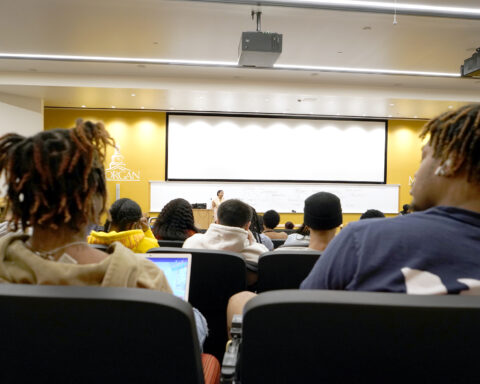Courtesy of Morgan State University
Morgan State University announces a newly awarded $399,747 research grant from the U.S. Department of Education’s (ED) Institute for Education Studies (IES). The grant will be used to prepare minority-serving institution faculty members to conduct high-quality education research that advances knowledge pertaining to the impact of trauma-informed teaching practices in online learning environments. The three-year grant is only the second of its kind to be awarded to a Historically Black College and University (HBCU) by the Department of Education.
The principal investigator (PI) for the grant-funded research is Virginia L. Byrne, Ph.D., an assistant professor of Higher Education and Student Affairs in the Department of Advanced Studies, Leadership, and Policy within the School of Education and Urban Studies (SEUS) at Morgan. Dr. Byrne’s research study, titled “The Learning and Engaging at a Distance (LEAD) Initiative: Exploring Trauma-Informed Online Teaching Practices in Higher Education,” focuses on the benefits of Trauma-Informed Online Teaching (TIOT) practices for HBCU students in online classes. The study aims to improve the academic outcomes of Black and African-American college students by investigating the impact of trauma-informed teaching practices in online learning environments.
“Dr. Byrne is pursuing the caliber of forward-thinking investigative study that fully aligns with our mission of addressing the needs and challenges of today’s urban environment as well as advances the very meaningful research activity within an ascending R1 Carnegie-classified institution,” said Hongtao Yu, provost and senior vice president of Academic Affairs at Morgan. “Thanks to this investment from the Department of Education, Morgan will be at the forefront in establishing evidenced-based best practices for stewarding the academic success of our most vulnerable students.”
While the value of trauma-informed teaching in face-to-face K-12 classroom instruction is well documented, limited research exists on the impacts of trauma on college students in online instruction modalities. Filling this void, the LEAD initiative, spearheaded by Dr. Byrne, will focus on trauma’s effects on BIPOC students at the university level. Trauma manifests in ways that educators find acutely challenging in an academic setting. Chief among them include the propensity for traumatized students’ struggle to engage in traditional school activities, regulate their effort and motivation, authentically participate in classroom discussions, and persist to graduation.
This novel research will delve into the relationship between TIOT practices and student outcomes among HBCU undergraduates, examining how this relationship may differ based on levels of self-directed effort. The project will also explore various factors influencing student achievement and persistence outcomes within the context of TIOT practices.
“I am honored to receive this award from the U.S. Department of Education’s Institute of Education Sciences (IES) and look forward to partnering with Morgan faculty to study how aspects of Trauma-Informed Online Teaching support students who have been affected by trauma in their lives,” said Dr. Byrne. “This work is especially important as we emerge from the COVID-19 pandemic which we know was considerably traumatic for many young people who are now beginning their undergraduate journeys.”
The LEAD research project will unfold in three phases beginning with a pilot study conducted among five faculty members, followed by expanded participation with 20 faculty members and their enrolled students in each subsequent phase. The comprehensive analysis of collected data will employ quantitative, qualitative, and mixed methods approaches to address the research aims.
According to Dr. Byrne the research findings generated will have widespread relevancy to the education profession and practice in the U.S. The outcomes derived from the LEAD initiative will demonstrate how TIOT relates to the existing frameworks of equitable online teaching and clarify how trauma-informed teaching supports the course experiences of undergraduate students, encompassing their perception, performance (grades), persistence, and ultimately degree completion.
“Further, the proposed work has implications for faculty, faculty developers, and researchers who wish to improve their online course design and facilitation to improve student persistence and achievement outcomes. The findings, knowledge, and skills that I will obtain from the LEAD Initiative will inform the future development of faculty development interventions and online teaching policy and procedures,” added Dr. Byrne.
The Early Career Mentoring Program for Faculty at MSIs is a program, the source of the grant-funded research, is part of the National Center for Education Research (NCER), one of the four centers within the IES supporting rigorous research that contributes to the solution of significant education problems in our country. NCER-supported research activities improve the quality of education to impact student academic achievement, reduce the achievement gap between high-performing and low-performing students, and increase access to and completion of postsecondary education. The LEAD initiative is part of NCER and IES’s larger commitment to foster innovative education research that addresses the needs of diverse students and schools across the nation by supporting education researchers through funded exploratory research and career development training under the guidance of experienced mentors.
During the span of the 3-year LEAD research initiative, Dr. Byrne has identified several touchpoints to engage and empower Morgan’s academic community with study results. Research findings, along with survey tools, will be shared across academic units and strategic partnerships will be leveraged among key Morgan research centers, including the Center for Innovative Instruction and Scholarship (CIIS) and the National Center for the Elimination of Educational Disparities (NCEED). Additionally, faculty development programs, graduate course development, and teaching workshops to foster discussions around Trauma-Informed Online Teaching practices are all planned.


